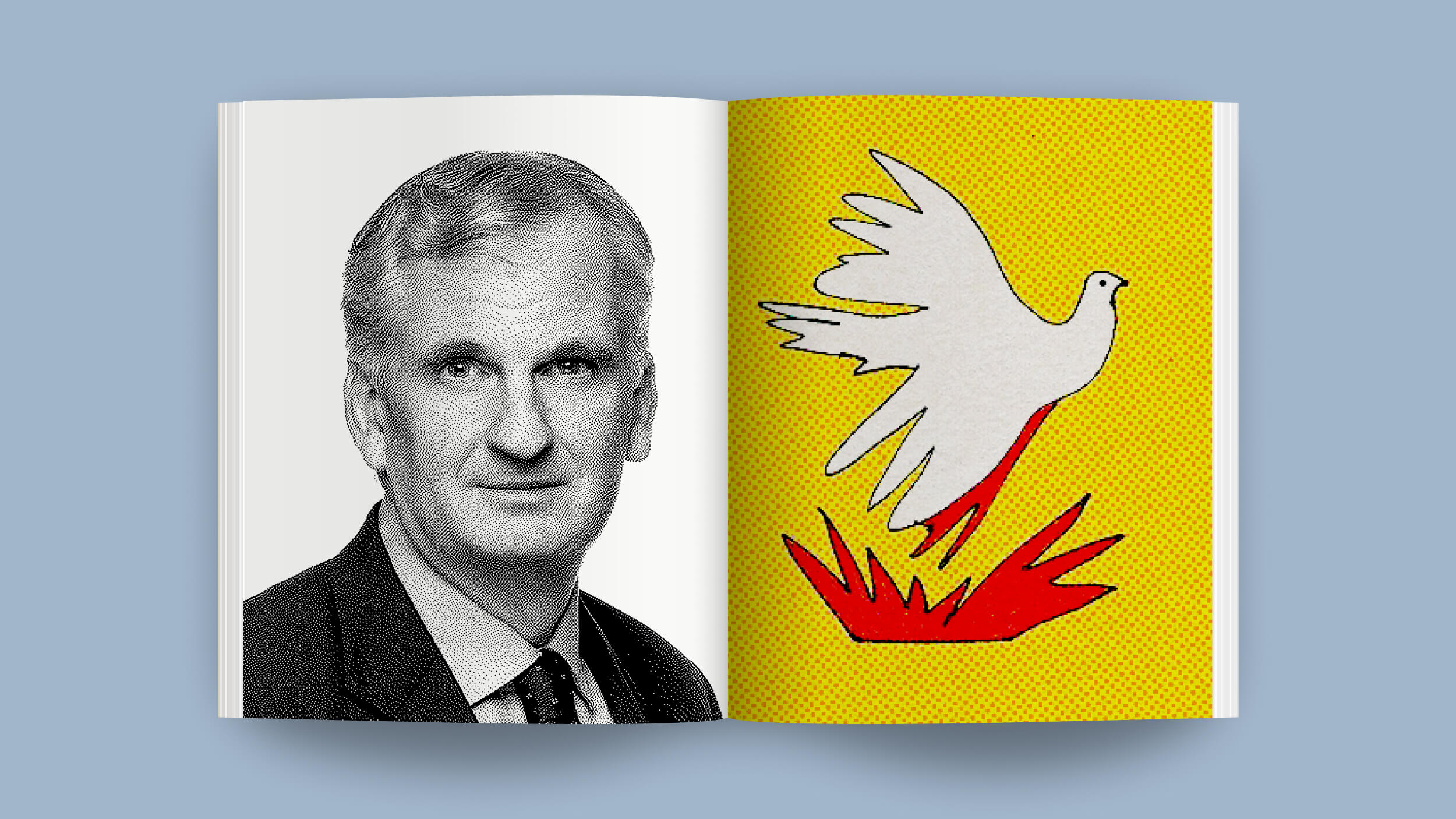Bert Randolph Sugar is a writer sports historian who has written over 50 books, mostly about baseball and boxing. He was the owner and editor of of Boxing Illustrated magazine[…]
Sign up for Big Think on Substack
The most surprising and impactful new stories delivered to your inbox every week, for free.
Heavyweight champions today are so anonymous that you could put them all in a police lineup in gloves, robes, and trunks, holding their belts aloft, and no one would know who they were.
Question: Does a sport as violent as boxing still have a rnplace in our society?
Bert Sugar: Well, in today’s rnsociety... you know, I quoted a Budd Schulberg line about boxing is rnchess played with human bodies. We’re in a violent world. You’ve got rnmixed martial arts, which is Grand Theft Auto played with human bodies. rn I don’t know whether the cages are there to keep the participants in orrn the spectators out. I haven’t heard "ban boxing" for 20 years, as the rnsociety gets more violent. Yes, there was a call for it, the AMA. I rnused to argue with them back in the ‘80’s. They’d say "There’s brain rndamage." And I said, “Yep, if you get hit in the head too many times, rnbut so is there in football.” “No, there’s none in football.” And rnthey’ll go on, “They’re wearing helmets.” Tell that to the guys who arern now like John Mackey walking into walls. All of a sudden, they found rnit in football. Troy Aikman retired after eight concussions.
Inrn boxing if you get a knockout... if you’re knocked out, you’re suspendedrn for 30 days. In football, if you’re lying on the ground with a rnconcussion, they’ll take you out and put you back in, in 30 seconds. rnAnd the announcers trivialize it, “He got a dinger.” He’s going to the rnwrong sideline looking out the earhole, he’s got a "dinger." So, rnboxing, I think is really—there was a study done where, I think it was rnthe ninth- or tenth-most-dangerous sport. And those above it, includingrn luge and bungee jumping and now football are accepted. And so is rnboxing.
Boxing has other problems though; it’s lost its place rnin terms of favoritism amongst the sports fan, and part of that reason rnis simply stated that when it was at the top of the fan preference list rnback in the first 50 years of the last century, through 1950s, there rnwere only three sports of major import. There was boxing, baseball, andrn horseracing. Pro football didn’t come to the popular frame of rnreference and into great popularity until '58, until the New York Giantsrn played the Baltimore Colts in the greatest game every played, et rncetera. You couldn’t give away pro basketball—it was played in the rnafternoon. They call came of age, and boxing kept going down the list rnof the preferred sports.
We now have so many sports—I mean, do rnyou know Texas Hold’em is a sport? I see it on ESPN all the time. I’m rnwaiting for competitive pole dancing. I mean it’s gotten silly out rnthere. But everything’s a sport. X-games, Y-games, Z-games, who cares rngames. "Y" is right. Why games? But boxing continues to lose its rnposition and that’s a problem.
The heavyweight champions today rnare so, almost anonymous, you could put them all in a police lineup in rngloves, robes, and trunks holding their belts aloft, and not only would rnno one know who they are they wouldn’t know what these guys do for a rnliving. But the heavyweight champion was the great... we haven’t had a rnheavyweight champion in so long that we could identify with, whose name rnisn't Klitschko. And I think there’s only one or two of them keep rnwalking out of a room and changing their name, I think there’s one guy, rnthat it suffers. The sport suffers because it’s not that identify... atrn least in the United States.
rnQuestion: What's wrong with professional boxing today?
rn
Bert Sugar: I’ll tell you want the problem is. Lennox rnLewis, very good fighter showed us that fighters 250 pounds or more rncould move, could punch, could be entertaining, and could box. Now, rnRocky Marciano was 189. Joe Lewis was 204. This was at their rnheaviest. Mohammad Ali was 224 at his heaviest. We’ve not got rnheavyweights up to 300 pounds. Nicolai Valuev. And then a kid, a rntalented kid, an American, let’s just stay there, who is talented in rnathleticism and in an athletic way and over 250 pounds would go into rnfootball. The best American heavyweights are named Ray Lewis and Brian rnUrlacher because they’re over 250, and they can make more money. That’srn what happened to the heavyweight division in America.
Recorded May 4, 2010
Interviewed by Austin Allen
Bert Sugar: Well, in today’s rnsociety... you know, I quoted a Budd Schulberg line about boxing is rnchess played with human bodies. We’re in a violent world. You’ve got rnmixed martial arts, which is Grand Theft Auto played with human bodies. rn I don’t know whether the cages are there to keep the participants in orrn the spectators out. I haven’t heard "ban boxing" for 20 years, as the rnsociety gets more violent. Yes, there was a call for it, the AMA. I rnused to argue with them back in the ‘80’s. They’d say "There’s brain rndamage." And I said, “Yep, if you get hit in the head too many times, rnbut so is there in football.” “No, there’s none in football.” And rnthey’ll go on, “They’re wearing helmets.” Tell that to the guys who arern now like John Mackey walking into walls. All of a sudden, they found rnit in football. Troy Aikman retired after eight concussions.
Inrn boxing if you get a knockout... if you’re knocked out, you’re suspendedrn for 30 days. In football, if you’re lying on the ground with a rnconcussion, they’ll take you out and put you back in, in 30 seconds. rnAnd the announcers trivialize it, “He got a dinger.” He’s going to the rnwrong sideline looking out the earhole, he’s got a "dinger." So, rnboxing, I think is really—there was a study done where, I think it was rnthe ninth- or tenth-most-dangerous sport. And those above it, includingrn luge and bungee jumping and now football are accepted. And so is rnboxing.
Boxing has other problems though; it’s lost its place rnin terms of favoritism amongst the sports fan, and part of that reason rnis simply stated that when it was at the top of the fan preference list rnback in the first 50 years of the last century, through 1950s, there rnwere only three sports of major import. There was boxing, baseball, andrn horseracing. Pro football didn’t come to the popular frame of rnreference and into great popularity until '58, until the New York Giantsrn played the Baltimore Colts in the greatest game every played, et rncetera. You couldn’t give away pro basketball—it was played in the rnafternoon. They call came of age, and boxing kept going down the list rnof the preferred sports.
We now have so many sports—I mean, do rnyou know Texas Hold’em is a sport? I see it on ESPN all the time. I’m rnwaiting for competitive pole dancing. I mean it’s gotten silly out rnthere. But everything’s a sport. X-games, Y-games, Z-games, who cares rngames. "Y" is right. Why games? But boxing continues to lose its rnposition and that’s a problem.
The heavyweight champions today rnare so, almost anonymous, you could put them all in a police lineup in rngloves, robes, and trunks holding their belts aloft, and not only would rnno one know who they are they wouldn’t know what these guys do for a rnliving. But the heavyweight champion was the great... we haven’t had a rnheavyweight champion in so long that we could identify with, whose name rnisn't Klitschko. And I think there’s only one or two of them keep rnwalking out of a room and changing their name, I think there’s one guy, rnthat it suffers. The sport suffers because it’s not that identify... atrn least in the United States.
rnQuestion: What's wrong with professional boxing today?
rn
Bert Sugar: I’ll tell you want the problem is. Lennox rnLewis, very good fighter showed us that fighters 250 pounds or more rncould move, could punch, could be entertaining, and could box. Now, rnRocky Marciano was 189. Joe Lewis was 204. This was at their rnheaviest. Mohammad Ali was 224 at his heaviest. We’ve not got rnheavyweights up to 300 pounds. Nicolai Valuev. And then a kid, a rntalented kid, an American, let’s just stay there, who is talented in rnathleticism and in an athletic way and over 250 pounds would go into rnfootball. The best American heavyweights are named Ray Lewis and Brian rnUrlacher because they’re over 250, and they can make more money. That’srn what happened to the heavyweight division in America.
Recorded May 4, 2010
Interviewed by Austin Allen
▸
5 min
—
with





